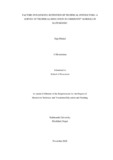
Please use this identifier to cite or link to this item:
https://hdl.handle.net/20.500.14301/481Full metadata record
| DC Field | Value | Language |
|---|---|---|
| dc.contributor.author | Dhakal, Raju | - |
| dc.date.accessioned | 2025-04-10T10:25:36Z | - |
| dc.date.available | 2025-04-10T10:25:36Z | - |
| dc.date.issued | 2024-11 | - |
| dc.identifier.citation | Dhakal, R.(2024).Factors influencing retention of technical instructors: A survey of technical education in community schools in Kathmandu. | en_US |
| dc.identifier.uri | https://hdl.handle.net/20.500.14301/481 | - |
| dc.description.abstract | The retention of technical instructors has always been one of the major challenges for TVET institutes in terms of their sustainability. So far, no study has been carried out on the factors influencing the retention of technical instructors in TECS schools in Nepal. Thus, identifying the factors influencing the retention of technical instructors was the central concern of this research. The study featured a quantitative approach to identify the factors influencing the retention of technical instructors in TECS schools in Kathmandu Valley. A survey was conducted using a contextualized questionnaire among the 180 technical instructors who have been teaching in valley-based TECS schools for at least one year. To analyze and interpret data, exploratory factor analysis, descriptive statistics, regression, and ANOVA were used. The result revealed four components that were influencing the retention of technical instructors, at least in valley-based TECS schools: i) Working Environment, ii) Work-Life Balance, iii) Overall Job Satisfaction, iv) Want, v) Personal and Professional Development. The study uncovered that the most influential factor in the retention of technical instructors was Personal and Professional Development Opportunities within the institute, followed by work-life balance. Among these factors, overall job satisfaction was less influential in the retention of the technical instructors. The findings of this study implied that job satisfaction, though a crucial factor, alone does not completely ensure long-term job retention. Professional development is highly valued by instructors, and so are the opportunities for career advancement. Additionally, the capability to manage work and personal obligations is a significant factor in instructors' decisions to remain in the institute. Thus, the study suggests that one of the strategies to prevent burnout and potentially increase retention rates is to provide flexible schedules and manageable workloads. Thus, this research identified the influential factors in the retention of technical instructors in valley-based TECS schools. The findings of this research can be helpful, especially for the program coordinators, principals, and the management committee who are struggling with the high turnover of the technical workforce in their institutes. The findings of this study are useful for helping the policymakers and other stakeholders in the TECS program. | en_US |
| dc.language.iso | en | en_US |
| dc.publisher | Kathmandu University School of Education | en_US |
| dc.title | Factors Influencing Retention of Technical Instructors: A Survey of Technical Education in Community Schools in Kathmandu | en_US |
| dc.type | Dissertation | en_US |
| local.school.name | SOED | en_US |
| local.school.department | Department of Development Studies | en_US |
| local.school.program | MTVET | en_US |
| local.school.level | Masters | en_US |
| Appears in Collections: | Research Project | |
Files in This Item:
| File | Description | Size | Format | |
|---|---|---|---|---|
| WCCThesis_Final_MTVET_Raju_Dhakal.pdf | 1.38 MB | Adobe PDF |  View/Open |
Items in DSpace are protected by copyright, with all rights reserved, unless otherwise indicated.